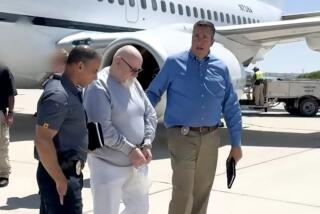FBI: Serial killer Israel Keyes was loose for a decade
Israel Keyes was a thorough and meticulous killer who selected his victims at random, and he financed his attacks with money made from bank robberies, officials said Tuesday.
Authorities also asked for the public’s help in their sprawling investigation into eight killings Keyes may have been responsible for. Keyes apparently committed suicide Sunday while in custody in Anchorage, Alaska.
Keyes, 34, had initially been charged with the kidnapping and killing of 18-year-old barista Samantha Koenig, but the investigation quickly expanded far beyond the attack on Koenig. After he confessed in March to killing the Alaska woman and hiding her body in a frozen lake, officials confronted him with suspicions that he’d killed before, and he confessed to targeting, kidnapping and killing a Vermont couple.
PHOTOS: Victims of confessed killer Israel Keyes
He is now suspected of having killed as many as eight people, and on Tuesday officials released more details about a seemingly emotionless serial killer who killed because he enjoyed it -- a man they called “a force of pure evil acting at random.”
As early as 2001, Keyes, a construction worker, had robbed “several” banks to help finance his trips throughout the U.S. to kill and kidnap, the FBI said in a statement, with officials corroborating two of those robberies.
He started to leave weapons and supply caches across the country in anticipation of future crimes. The FBI later discovered two of those caches in Eagle River, Alaska, and near Blakes Falls Reservoir in Parishville, N.Y. He told investigators other still-undiscovered caches also contained money and supplies to help hide bodies.
To investigators he described “several remote locations that he frequented to look for victims -- parks, campgrounds, trail heads, cemeteries, boating areas, etc.,” the FBI said.
Keyes apparently never knew his victims, which frustrated officials early in their investigations in Alaska and Vermont.
Investigators said he’d confessed to killing one person somewhere on the East Coast in 2009 and taking the body to New York.
He also claimed to have killed four people in Washington state -- two in separate attacks in 2005 and 2006, and a couple in one attack between 2001 and 2005 -- but no bodies have been found.
Much of the information about the killings came from Keyes himself, and he could be an erratic source: He confessed to the Vermont killings in explicit detail -- to the point of quoting what one of his victims said -- but would only give up information about his other killings in increments, with his final clues coming during an interview with investigators last Thursday.
Officials said they didn’t fully know why he decided to confess, even if only in innuendos. Although he was possibly facing the death penalty for killing Koenig, he never requested that officials drop the death penalty in exchange for his cooperation, according to Kevin Feldis, chief of the criminal division for the U.S. attorney’s office in Alaska.
But officials said Keyes also did not want to be publicly connected with the summer 2011 disappearance of Bill Currier, 49, and Lorraine Currier, 55, of Essex, Vt., and he stopped cooperating with investigators for a while after his name had been leaked to the public in connection with their deaths. He resumed talking later.
He told officials that none of his killings had received as much media attention as their case. He said he’d heard about one victim who had been found and whose death had been wrongly ruled accidental by the authorities. Yet officials still don’t know which victim Keyes was talking about or where the body was located.
Feldis said Keyes had been temporarily placed on suicide watch a couple of months ago, but Alaska prison officials did not immediately respond to requests for comment. His apparent suicide is being investigated by the Alaska Bureau of Investigation, which is awaiting the result of an autopsy and declined to release details about his death. Keyes’ attorney, federal defender Rich Curtner, has not responded to requests for comment.
More details about Koenig’s death were expected to be released later Tuesday. Officials also released a timeline of Keyes’ whereabouts over the last decade and asked anyone with information about Keyes to call (800) CALL-FBI.
The timeline of Keyes’ movements across the U.S. stretch from 2004 until his arrest in March in Texas, where he had been accused of using a debit card he’d stolen from Koenig and making withdrawals of ransom payments.
More to Read
Sign up for Essential California
The most important California stories and recommendations in your inbox every morning.
You may occasionally receive promotional content from the Los Angeles Times.











